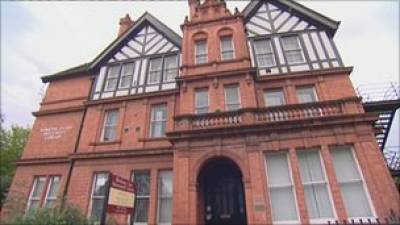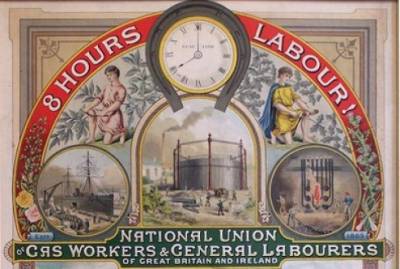Not just a rambler! by Bernard Barry
The Mass Trespass over Kinder Scout in 1932 has ever since then been the subject of innumerable articles in many national and local newspapers, magazines and journals etc. It has been the main theme of schools, conferences, seminars, debates and lectures. Books, poems, plays, radio and television programmes have featured it. Bernard (Benny) Rothman's own book, The Kinder Scout Trespass, is truly a fascinating historical document and I would strongly urge anyone who has not yet read it to beg or borrow a copy. It is a rewarding read.
It is generally accepted now that this historic event paved the way for the 1949 National Parks and Access to the Countryside Act. April 24th, the date of the Trespass, has been marked over many years by anniversary reunions and celebratory rallies supported by many leading national figures in such organisations as the Ramblers Association, the Peak and Northern Footpaths Society, the Open Spaces Society, the British Mountaineering Council, The Council for National Parks, the Peak Park Planning Board, the Council for the Preservation of Rural England, the Country Commission, the Woodcraft Folk, Red Rope, Sheffield Campaign for Access to Moorlands, the Amalgamated Engineering and Electrical Union, National Union of Public Employees and many others in the environmental field. All of them pay tribute to the leader of the trespass, Benny Rothman, though he would have been the first to point out that he was simply taking part in a historic movement to win the people's right to ramble freely over uncultivated land - forbidden to them by the selfish, grouse-shooting landowning classes.
Still rambling and campaigning in his 80s Benny sadly suffered a stroke in 1994, which left him confined to a wheelchair. Not that that stopped him entirely. Together and aided by his dear wife Lily he then fought successfully against a Council proposal to fence in and narrow a path near his home into a passageway making it difficult for mothers with prams to reach the local primary school. He has now retired to Essex with her to be near his daughter and family. Requests for his advice and help, which he always freely gave, were often made by outdoor organisations, journalists, students and occasionally by authors. He remained a well-known figure nationally in the rambling and outdoor world and also generally in the environmental field on many different issues. What is less well known is his political career, which played such a major role in his life. It had very humble beginnings.
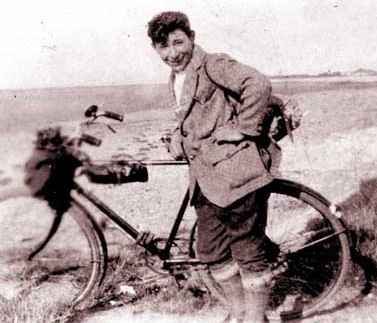
Benny Rothman : A young man and his bicycle
Benny was born on 1st June 1911. In his boyhood he knew little of life outside the crowded, squalid environment of Cheetham, a thickly populated working class district of north Manchester.
He won a scholarship to Manchester Central High School for boys but left just as he was about to take his matriculation exam, when a kind neighbour found a job for him. He had no option, the family was poor, his father had died when he was 12 - he had to help support his widowed mother and family.
Although Benny's uncle Arthur (Jack) Solomons who was for a few years the national treasurer of the ILP and a friend of Jimmy Maxton and Manny Shinwell and also involved with James Connolly in a big clothing workers' strike, he never influenced Benny politically. By contrast his Aunt Ettie introduced him to some Upton Sinclair books and the Ragged Trousered Philanthropists. He became an avid reader of similar works.
The job was in the motor trade. For his first two years at Tom Garner's Benny was an errand boy. Later he started a YMCA course in geography and economics. This interested Bill Dunn, a member of the Communist Party of Great Britain (CPGB), in discussing the subjects with his young workmate. In 1929 Bill invited him to a local Young Communist League (YCL) meeting. To quote Benny he found "they were talking his language" and he drifted into the organisation. Bill also took Benny to the Sunday night forums at the Clarion Club in Market Street to listen to the speakers there. At Garners he became very outspoken on socialism and communism. In late 1929 he was arrested for chalking on the Piccadilly pavement "Look out for the Daily Worker - out January 1st 1930". Despite the protest of Frank Bright, then organiser of the Manchester Communist Party, Benny was taken to court and fined 7/6. His position at Garners was prejudiced when the Press reported the case and even more so when Benny started selling 50/60 copies of the paper daily. This dwindled after a short while but he still sold a few in the garage. The bosses were not pleased. When Garners merged with Rootes rationalisation followed and inevitably the young communist was one of the first to go. Benny was redundant.
Benny had acquired a bike (built of spare parts!). He began to discover the countryside and very quickly developed a lifelong passion for the outdoors. Armed with a 6p Woolworth's map he spent his 16th birthday climbing alone to the summit of Snowdon. He became a keen rambler and cyclist. On joining the Clarion Cycling Club he immediately became the minutes secretary.

British Workers Sports Federation Manchester camp : Group photograph
In 1931 Benny helped to establish a group of the British Workers Sports Federation (BWSF) and soon became its secretary for the North. He organised popular Sunday rambles and camping and cycling weekends in the Peak District involving workmates from Garners and friends from the Clarion Cycling Club and Cheetham. After the Easter 1932 camp at Rowarth the idea of the Mass Trespass took hold and was realised a month later. Blacklisted after serving his sentence in Leicester jail Benny went at the YCL's suggestion to North East Lancashire to try and build a branch there. With his zest for sport he organised some factory football teams and a rambling club but difficulties resulted in their demise. He returned to Manchester after six months still unemployed. Then he worked for a year (1933/4) at a local garage but left to get a job at AVRO's aircraft factory in Newton Heath where he thought he could do far more industrial and political work. Immediately he joined the Amalgamated Engineering Union's (AEU) Manchester 2nd branch he became its minutes secretary and soon was elected to be its delegate on the Manchester and Salford Trades Council. His political activity soon exposed his communist beliefs and before long the AVRO management found a pretext to sack him.
The political atmosphere in Cheetham with its large Jewish population was strongly anti-fascist and charged with the drive for peace. At this time Benny was active in the Youth Front against war and fascism, which later merged with Cheetham YCL. He involved himself ever more in the YCL and became secretary of the Cheetham branch. He helped to build up the Challenge Club which while political also had social activities such as rambles, cycle runs, gymnastics, Sunday night dances etc. even building a 'Flying Flea'. This attracted some 500 members, of whom roughly half joined the YCL. About 75% of the members were Jewish. Probably the appeal of such a broad organisation coupled with the fights against the Blackshirts led by Cheetham YCL contributed to the decline of the BWSF. At a British Union of Fascists (BUF) meeting on Marshall Croft its van was turned over. At another BUF meeting opposite Crumpsall Library, Benny was arrested and bound over for 12 months to 'keep the peace'. In 1933 he intervened when Evelyn Taylor (later Jack Jones' wife) was physically attacked by BUF stewards as she was heckling Mosley in the King's Hall at Belle Vue. He threw out some anti-Mosley leaflets but then was thrown bodily over the balcony but luckily his fall was broken by a blackshirt below. The brutality shown at that meeting by the blackshirts was reported to a counter meeting that evening in the Free Trade Hall and later to Parliament which led to the passing of the Public Order Act. Some 60 years later he was involved in a Trades Union Congress education project with Danish trade unionists on tackling racism and fascism as part of the European Year of the Older Person.
Not long before he left AVRO's Benny married the mill girl he had met at a peace camp, his comrade Lily Crabtree, who came from a communist family in Rochdale. They lived briefly in Failsworth then settled in Timperley in 1936 so that Benny could be nearer his new job as a fitter at Metro-Vicks in Trafford Park. Soon he began selling the Daily Worker in the factory, though not openly. He collected contributions regularly in support of Aid to Spain. At a big meeting in the Free Trade Hall he volunteered to be an ambulance driver but was frustrated by not being accepted, largely because he was an inexperienced driver. Moreover it was felt that he could better help the cause through his trade union and factory work.
When Benny condemned Chamberlain for the Munich agreement in 1938 he was called a warmonger and ostracised by his Labour Party workmates although a year later there was some realisation that Munich had not brought "Peace in our time". Again when the Soviet-German non-aggression pact was signed Benny had a rough period at work, the pact being seen as a sell-out by the treacherous Russians. Benny was very strongly anti-Hitler and thought that the stand taken by Harry Pollitt as to the anti-fascist nature of war was correct. He joined the Home Guard.
Metro-Vicks was a conglomeration of factories, then employing some 22,000 workers, the biggest industrial complex in Europe. Just prior to World War II breaking out Benny, after two years as shop steward in his department, became the delegate to the Works Committee for the 800 to 900 workers in the West Works switchgear and about another thousand on radar work in West Works 5. He had won the respect of nearly 2000 workers as a first class trade unionist ever alert to their interests, especially their working conditions and piece-rates. In 1942 he helped set up the Timperley branch of the AEU and served 11 years as one of its officials. He became later the senior AEU Works Committee delegate. Under his leadership West Works became 100% trade unionised, a band of united shop stewards had weekly meetings and led every struggle in Metro-Vicks for wage increases, against management manoeuvres to interfere with piece-rates, and many other related issues. Benny edited the bulletin to keep their department up to date with authentic information. Small wonder that instead of spending the agreed one hour a day on union work he would often spend 8 to 10 hours, almost full-time!
As the war progressed Benny helped to establish a Joint Production Committee and secured agreement on increased output without change to ordinary norms and conditions, which boosted production greatly. On one job the bonus rose to 600/700%! Girls newly recruited into the factory were initially given unsatisfactory low rates. Benny immediately blasted his way through the normal procedures to see higher management. The girls then got guaranteed new prices for their work.
By 1944 Benny was selling daily 70 to 80 copies of the Daily Worker in the factory. This was emulated by one of his stewards in another department. Some of his stewards joined the CPGB branch there. Strong support was given by Benny's department to left-wing candidates in local elections. He regretted the CPGB's later mistake in switching from factory to area branches, considering that its leadership of the trade union movement in the Metro-Vicks factories was thereby much weakened. After the war Benny was on the Post-War Planning Committee. Without a change to alternative work redundancies ensued. Over the next twelve months despite Benny's battle to save the jobs they were lost.
A dispute arose in November 1951 when a welder was told to do a fitter's job. Benny called a meeting - with management permission. The men struck for an hour and the proposal was dropped. The management seized on Benny's taking part in the hour's stoppage as an excuse to sack him. Nearly 3,000 men struck immediately to protest at this blatant victimisation. The AEU Manchester District Committee supported the men. They remained out for eight days. The Strike Committee printed leaflets and a small paper called Unity in defence of the right to strike and lobbied the AEU EC to recognise the strike. This was refused, although they allowed dispute benefits. The Strike Committee then became the Re-instatement Committee and in March 1952 the 75 AEU Metro-Vicks shop stewards confirmed their view that Benny had been victimised. The management conceded that an application for re-employment by Benny could be considered 'after a reasonable time'. Reasonable was never defined. Benny started work at Staveley Machine Tools of Broadheath. He had won his point at Metro-Vicks but wouldn't go back.
The foregoing is but a part of a much longer story. Researches are continuing into the archives left by Benny at the Working Class Movement Library into the years after 1951. These cover his 20 years' service as chairman both of the shop stewards' committee and convenor at the Kearns-Richards factory (of Staveley Tools) and the Broadheath shop stewards' forum, his service on the Manchester AEU's district committee, at different times as secretary and president of Altrincham Trades Council, on its executive and later on that of Trafford Trades Council, and as delegate to the Lancashire and Cheshire Federation of Trades Councils.
They cover his leadership of many campaigns for wage and cost of living awards, against redundancies and closures, against the Industrial Relations, Criminal Justice and Public Order bills, his Parliamentary lobbying on these and later on pensioners' issues. He organised strong groups in Trafford in support of the Grunwick strikers and later of the miners. Letters from Benny were frequently in the Altrincham Guardian and other local papers and he wrote a weekly column for the Timperley Independent. He edited the monthly newsletter of Altrincham Communist Party and was the Communist candidate in municipal elections for Dunham Ward. Benny advised the CPGB Congress, where he was a delegate, on its resolution on 'Access to the Countryside'. He advised also on the CPGB's Pensioner Advisory Committee.
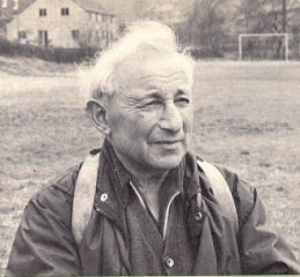
Benny Rothman in the 1980s
After the collapse of the CPGB he was involved in the Communist Campaign Group's work which led to the establishment of the Communist Party of Britain. In 1982 Benny formed the Kinder Scout Advisory Committee and in 1989 the Rivington Pledge Committee and was secretary of both. He led the campaign against the privatisation of water authority land, and took part in public enquiries on Ashton Moss, Kingswater Park and Davenport Green. He supported the efforts of Friends of the Earth, Greenpeace, Worldwide Fund for Nature etc. to protect the environment and also fought against the motorway spoliation of the countryside as at Twyford Down. Ever vigilant on rights of way he also encouraged urban access in his 'Aspects of Altrincham' articles. Prominent in the fight against the military use of Holcombe Moor and other areas of open land and in the Campaign for Nuclear Disarmament (CND) national action at Coulport on Loch Long, he was also active in Altrincham CND and Trade Union CND, and became a delegate to the CND annual conference. He gave slide shows to peace groups to show the true picture of the Soviet view of disarmament. He was a member of the National Insurance Tribunal, the Family Practitioner Committee of Trafford Health Authority and the Pensioners' Liaison Forum.
Yet however prodigiously busy he was he still made time to tend his allotment and supply tomatoes and other produce to the annual Daily Worker/Morning Star bazaars - the list of his activities seems endless. In 1990 the AEU gave Benny its highest award, the Special Award of Merit. In 1996 the Ramblers' Association executive made him an honorary life member. His genial but militant leadership, always based on his close touch with the working class, made an immense contribution to its history. This selfless, untiring political and environmental workaholic was truly a living legend .
Benny Rothman died at 1.30pm on 23rd January 2002, aged 90, after a massive stroke.
Related Object of the Month
August 2012: Workers' Sports Movement pamphlet
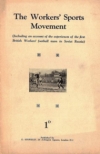 This 1928 pamphlet describes some early international sporting events, and gives an account of the experiences of a British Workers' Sports Federation football team tour of the Soviet Union.
This 1928 pamphlet describes some early international sporting events, and gives an account of the experiences of a British Workers' Sports Federation football team tour of the Soviet Union.
Resouces relating to Benny Rothman in the Library collection
Benny Rothman collection (PP/ROTHMAN)
- Personal papers and family photographs of Benny Rothman.
- Papers and correspondence relating to Benny's employment and the Amalgamated Engineering Union, Broadheath Shop Stewards and Altrincham and Sale Trades Council.
- Papers relating to Benny Rothman's political campaigning and work, support and donations for various groups. Also Benny's support for the Miners' Strike, 1984-1985.
- Papers relating to Benny Rothman and the Kinder Scout mass trespass including court proceedings, committee minutes, talks and books, anniversary committee minutes papers and publicity during the anniversary.
- Papers relating to the Ramblers' Association, access to land and the countryside, the Countryside Commission, environmental issues, water privatisation and other societies and groups. Also environmental and rambling issues in Greater Manchester, the Peaks and the Pennines and Rivington Pike.
- Correspondence between Benny Rothman and key rambling figures and reviews of books.
Books and pamphlets in the Library relating to Benny Rothman
Benny Rothman, The 1932 Kinder trespass: a personal view of the Kinder Scout mass trespass, (1982) - Shelfmark: J06
Communist Party of Britain, Benny Rothman and Kinder Scout 1932-2012 (2012) – Shelfmark: AG Rambling Box 2
Malc Cowle, Trespassers!: a tribute to Benny Rothman and all fighters for the freedom to roam (2012) – Shelfmark: C27
Roly Smith, Kinder Scout mass trespass: 70th anniversary celebration, Sat 27th April 2002 (2002) – Shelfmark: AG Rambling Box 2
The Worker Sportsman Vol 1 nos 1 and 2, May and June 1932 - contemporary articles about the Mass Trespass - Shelfmark: AG Communism - Periodicals A-Z

